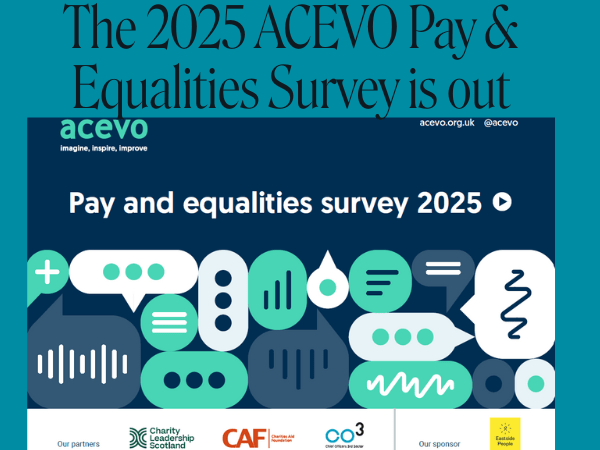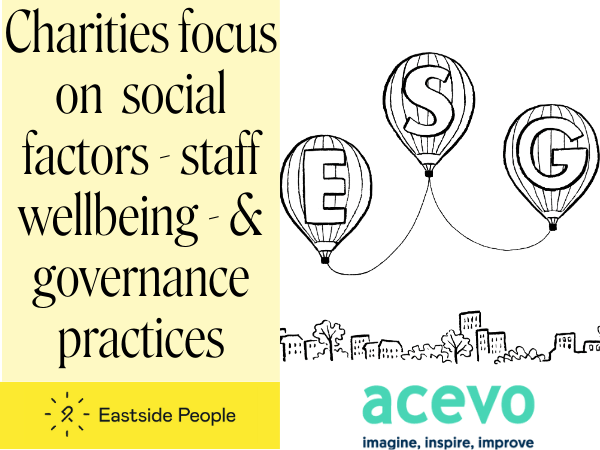Interim Management at a Charity or Not-for-Profit: Blog written by Abi Levitt, Eastside People Consultant.
I am a senior generalist who has been involved at management level in the social sector for over 20 years – the last eight of which working as a consultant in a strategic and advisory capacity and blending that with periods as an executive interim hire.
Since 2018 I’ve supported over 40 charities and social enterprises on a wide range of assignments – from development and income generation to communications and culture, from leadership coaching to governance and impact. It’s this broad experience which has given me a strong platform to take on fixed term contracts of between 3-18 months as an interim Director or CEO at a number of not-for-profits. Some executive interims focus only on short term contracts, but I enjoy a working life which blends interim hires with project consultancy.
Bringing in an experienced leader on an interim contract can be invaluable for a charity or not-for-profit organisation facing change or a challenging period, or where the right expertise isn’t available internally. An experienced interim will do much more than ‘hold the fort’ – as outsiders they will be able to bring fresh perspective and independent, critical thinking to key operational issues such as process improvement, restructuring, or a transformation programme, etc.
What can interim managers do at your charity?
Every brief is different, but there are several areas where interim hires tend to focus their time:
- Providing the expertise, vision and fresh ideas to move an organisation through change
- Stabilising the business and maintaining morale – communicating what’s happening to staff, funders, volunteers, and other key stakeholders, listening to concerns and protecting the organisation against a loss of confidence and morale
- Managing major initiatives and new ways of working and driving forward the projects needed to deliver the organisational change required
- Building skills and competence and empowering individuals internally
- Preparing for the recruitment of the permanent replacement.
Stability of leadership is key during times of change to ensure that the organisation is in good shape when the post holder returns or a new, permanent hire is made. The interim management model provides a flexible, cost-effective resource at speed – a short-term hire for a specific duration or on a project basis, which gives charities and other not-for-profits the flexibility to bring in the right people as they need them, without having to commit to another employee, with all the employer on-costs that result.
What to look for when hiring an interim manager for your charity
To ‘hit the ground running’, the interim needs to be effective quickly and able to assess a situation from a variety of perspectives, Accordingly, a short-term executive hire should have a strong track record in senior management roles (both permanent and temporary) and proven strategic experience, if they are going to improve performance and drive change within a relatively short time frame. adapting at pace to new challenges, cultures and people.
It’s also important to prioritise your list of requirements when looking for an interim manager. How high up on your list is finding someone who has direct experience in the not-for-profit industry or in the sector in which you operate for example? Could you accept someone who has exactly the skills and experience you want who also has a strong alignment to your charity’s goals and is available during your specified dates, times and locations? What would be the risk to your project or service delivery by delaying?
What competencies should you be looking for in an interim charity manager?
The particular competencies of an interim hire should align with the outcomes the organisation is looking for. However, certain characteristics will be common across those roles, including:
- Motivated by complex, challenging situations with demanding timeframes
- Adaptable and flexible, comfortable with new and changing environments and teams
- A big picture person who is also able to home in on the major points of challenge, underperformance, or dysfunction
- Strong interpersonal communication and people management skills
- Ability to analyse quickly the pivotal issues facing an organisation and implement a programme of corrective action
- Skilled at navigating challenging situations, and able to implement improvements quickly.
- Self-sufficient, proactive leader
- Results-oriented and confident about the role they play.
What to look out for when you take on an interim role in a charity or not-for-profit organisation
The personal characteristics you will need as a senior interim in charities or other not-for-profits, include:
- Having confidence about going cold into new situations, ready to shift into high gear without knowing a great deal about the organisation or its challenges
- Being good at the ‘people thing’ – engaged and empathetic leader, able to build trust and confidence quickly, willing to take the time to listen and learn
- Experience in getting to grips with culture and internal politics
- An ability to see the big picture and avoid being ‘pulled into the weeds’, but nevertheless happy to roll sleeves up to get the job done
- Being prepared to raise difficult issues when giving feedback on challenges and solutions.
If you’re about to take on an interim role, make sure that:
- You’re clear about your remit and that you are working to a brief with realistic deliverables
- You are comfortable with the level of authority invested in and resources allocated to support the role you’re taking on
- Your skills set and experience match the skills required for the assignment
- Your line management is clear and will be on hand and available for regular reviews
- The Board’s position is clear regarding the challenges and key concerns
- You don’t get drawn into any internal ‘drama’ – your role is to provide objectivity and stability.
Importantly, you should also appreciate that most of what you need to know won’t be in the recruitment brief and that many things will only emerge once you’re in place.
The diversity and ever-changing nature of the interim experience will not suit everyone. For those who do enjoy working with a constantly changing brief, it’s a great way of life. A good interim should be seen as is a caretaker/expert who ‘steers the ship’ temporarily and leaves an organisation in a better state than when they arrived – stronger and with increased internal capability.
Find out more about Eastside People’s Interim Management services.
Read more about Eastside People consultant, Abi Levitt.








